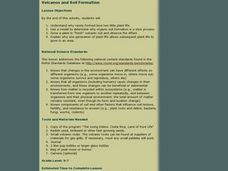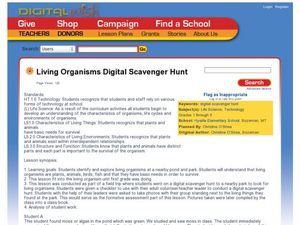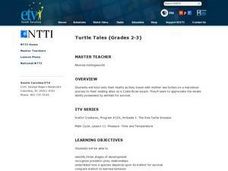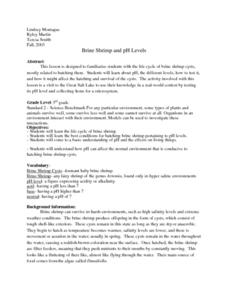Curated OER
Water's Edge Café
Students observe water birds feeding at a local wetland, record what they see, and construct an appropriate menu for a "Waterfowl Cafe." They also play a "flocking" game.
Curated OER
Holy Habitats or Meet Metamorphosis
Young scholars examine the metamorphosis of frogs and how it adapts to its environment. They research how world pollutants are effecting the amphibian population.
Curated OER
Why So Many Frogs?
Students explain the different stages in the growth of a frog, then analyze and collect data to make generalizations about a larger population. They determine the survival rate of a population of tadpoles under controlled conditions.
Curated OER
Beaver Ecology
Students explore the lives of bgeahvers. They identify the physical and behavioral adaptations that help beavers survive in their environment. Students compare and contrast how beavers influence the ecology of both forest and aquatic...
Curated OER
Frog Metamorphosis
Students play 20 Questions with animal characteristics and then view an animation of how a tadpole changes into a frog. They consider the importance of camouflage to frogs and write out the story of a frog from tadpole to adult.
Curated OER
Environmental Conditions: Friend or Foe
Students research and answer questions on how organisms are classified and how their needs are met through their environment. They work in small groups and create a poster, chart, rap, PowerPoint, or brochure demonstrating how organisms...
Curated OER
Observing Pods
Students observe the pistil growing into a tiny string bean-like seed pod. They then observe the development of the fertilized pods between Day 17 and Day 35 and record their observations by drawing and labeling, writing, and graphing. ...
Curated OER
Living Organisms Digital Scavenger Hunt
Students photograph living organisms. In this plan for a field trip, students go to a local park or pond and photograph themselves with various living organisms on their scavenger hunt list. The photographs taken are compiled into a...
Curated OER
Enrichment Activities - "Mrs. Frisby and the Rats of NIMH"
Fifth graders read the novel "Mrs. Frisby and the Rats of NIMH." They discuss the various characters in the book, and the different types of conflict that take place within the book. They also research owls and rats to make comparisons...
Curated OER
What's In The Forest?
Students examine forest food chains and create a forest habitat in the classroom. They are introduced to the concept of interdependence in Nature. They define a simple forest food chain and develop inquiry process skills.
Curated OER
Oh Panther
Students play a game that replicates the balance of prey and predators in an ecosystem. In this physical education lesson, students follow the instructions to play "Oh Panther!" Students collect data regarding the game and discuss the...
Curated OER
All The Seasons
Students explore winter, spring, summer, and fall. In this science and technology lesson plan, students use "Kid Pix" to draw pictures that represent the four seasons.
Curated OER
Mushroom Prints
Students create a mushroom spore design on paper while studying the facts on fungi.
Curated OER
Turtle Tales
Students watch videos and fill out worksheets about the turtles and their journey to the Costa Rican beach. In this turtles lesson plan, students learn and discuss survival, predator and prey, and stages of development.
Curated OER
Hopi Culture: Parts of the Corn
Students identify the parts of the corn stalk in English and Hopi. They discuss the significance of corn to the Hopi culture, and examine a diagram of the corn stalk. They discuss the purposes of the parts of the corn stalk, then label...
Curated OER
Bird Feeding and Migration Observation
Students research bird migration and build a bird house. In this bird lesson plan, students research the birds in their area and where they migrate to. They also build their own bird house and record data on what kinds of birds come to...
Curated OER
Brine Shrimp And Ph Levels
Third graders investigate the different ph levels found in water that is tested using simple measurements. The water samples are taken from a local body of water. The ph levels are used to help indicate areas where shrimp can thrive in...
Curated OER
Keeping Warm
Students participate in an online activity to determine how objects heat and cool. They determine what objects best serve as thermal insulators.
Curated OER
Pushes and Pulls
Students recognize different types of movement and causes that my affect the movement. They know that pushes and pulls are types of forces.
Curated OER
Using Electricity
Students name appliances that use electricity. They construct a simple electrical circuit. They predict whether a circuit work. They name components of an electrical circuit.
Curated OER
Keeping Healthy
Students exercise their muscles to explore concept of heart rate and to explain how blood supplies muscles with oxygen.
Curated OER
Magnets and Springs
Young scholars participate in an online lesson making and recording observations of magnets. They determine that magnets attract some metals but not others and that other materials are not attracted to magnets.























